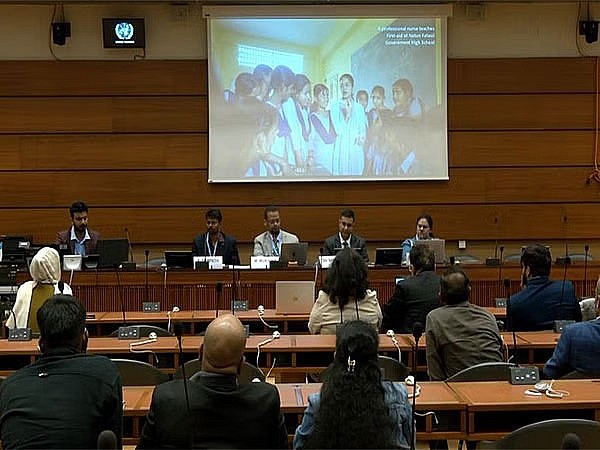 |
| NGOs from India participate at the 54th Session of the United Nations Human Rights Council (Photo/ANI) |
During the UN’s Annual discussion on the ‘Integration of a Gender Perspective’, Parmita Sharma, a social activist and the founder of Akshar Foundation, a women-led NGO based in India, emphasized that her organization firmly believes that poverty eradication and gender equality are interconnected goals.
 |
Parmita Sharma emphasized that a stronger emphasis on girls’ education is necessary to achieve the goal of equal integration of women’s perspective in the human rights council, other UN bodies, and government as a whole.
She stated that Akshar’s Model School focuses on implementing poverty eradication measures to effectively increase literacy rates and enhance employment opportunities for underprivileged girls. These efforts target the main contributing factors to gender discrimination prevalent within marginalized communities.
Parmita emphasized to the United Nations the importance of vocational training in nursing, tailoring, teaching, and electronics repair, coupled with apprenticeships to professionals. These initiatives play a crucial role in empowering girls to secure meaningful livelihoods and become self-sufficient providers for themselves and their families.
“We also offer self-defense training for girls, as well as provide opportunities for girls to participate in the National Cadet Corps, where they can prepare for future careers in law enforcement. These initiatives have had a positive impact on the communities we serve, leading to increased school retention rates among girls and a decline in child marriages. By empowering girls and encouraging them to delay marriage and child-rearing until adulthood, we are helping to break the cycle that previous generations have faced,” she elaborated.
According to her statement, India has recently enacted a new legislation that allocates one-third of the seats in Parliament for women.
“We request the Council and other international organizations to actively enhance the engagement of girls and young women from developing countries in events like this by providing scholarships and travel support,” she stated. She further emphasized that this initiative would have a profound impact, enabling all girls in their communities to realize their potential and participate on a global level.
A side event was organized by Rajasthan Samgrah Kalyan Sansthan (RSKS) with the theme “Ensuring Gender Equitable Practices at Every Place through SAMATVA” highlighting effective approaches to development and achieving SDGs.
In an interview with ANI, Hansraj Singh, the Communication Manager of Rajasthan Samgrah Kalyan Sansthan, discussed the organization’s new campaign called Samatva, which advocates for equitable practices. The campaign aims to ensure that every girl and woman have equal opportunities in all aspects of society, whether it be in the business sector, government institutions, or the workplace. By promoting women’s participation at all levels, the campaign seeks to promote equitable practices globally.
 |
He also mentioned, “We also presented a Samadhwa logo that could be adopted by workplaces to demonstrate their commitment to equitable practices. By utilizing our Samadhwa logo, they can signify that they prioritize the inclusion of women.”
Shweta Tyagi, the Chief Functionary of India Water Foundation, stated that the progress witnessed in India over the past decade has been spearheaded by women. She highlighted the significance of initiatives such as the Jal Jeevan Mission and Swachh Bharat Mission, which have been instrumental in empowering women.
 |
“In recent years, women have played a pivotal role in driving the development initiatives in India. This is evident in the various schemes that have been introduced, particularly in the areas of Water and Sanitation. Schemes such as the Jal Jeevan Mission and the Swachh Bharat Mission have been instrumental in empowering women, particularly those in rural areas. These initiatives have addressed the challenges faced by women, such as the need to fetch water from long distances and the lack of proper sanitation facilities. By implementing these schemes, women have been the primary beneficiaries, leading to significant improvements in their lives,” explained Shweta Tyagi during an interview with ANI.
“We should highlight that all the development initiatives in India, such as the Ujjwala Yojana and other schemes, are led by women. This showcases that India is a country that prioritizes women’s progress and their leadership plays a crucial role in their development,” she emphasized.
Volker Turk, the UN High Commissioner for Human Rights, has expressed his approval of the recent passage of the Women’s Reservation Bill in India. This bill will allocate one-third of seats in both national and state parliaments for women.
The landmark bill, which has been passed by both houses of parliament, will not only constitutionally entrench women’s representation in parliament but also serve as a transformative step in ensuring women’s right to participation and promoting gender equality in India.
According to the Spokesperson for the United Nations High Commissioner for Human Rights, Ravina Shamdasani, the UN High Commissioner has urged parliamentarians worldwide to enact appropriate legislative measures, including the implementation of gender quotas if necessary, to ensure equal representation of women in political discussions and decision-making processes. This would enable women’s voices to be fully heard and integrated alongside others in their respective nations. (ANI)
ASEAN promotes women’s empowerment in digital age
The ASEAN Leader’s Special Session on Women’s Empowerment in the Digital Age was held on June 26 in the framework of the 36th ASEAN Summit. The event was organised for the first time as an initiative of Vietnam to affirm ASEAN leaders’ commitment to promoting gender equality and enhancing the role of women in building the ASEAN Community.
First fairy tale books on gender equality launched for Vietnamese children
NDO – The first modern fairy tale picture books on gender equality for Vietnamese children were launched by UN Women, ChildFund Vietnam and Crabit Kidbooks on October 20, aimed at aimed eliminating harmful gender stereotypes and gender norms existing in fairy tales that hinder the comprehensive development of children.






